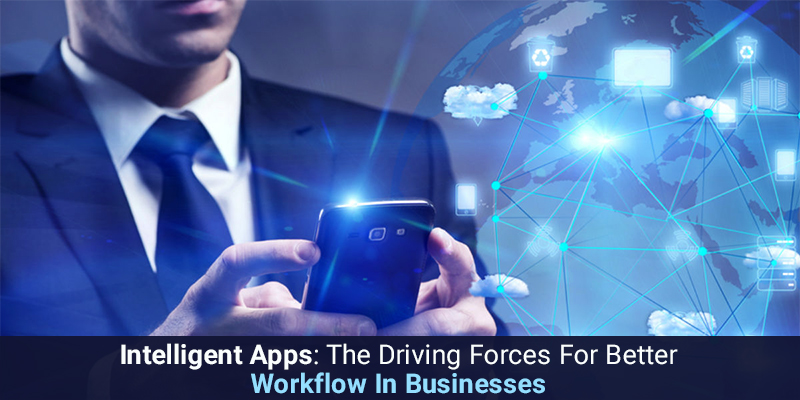Technology has become the daily saviors in the workplaces and the organizations have been thriving their existence on applications. The overall enterprise mobility can be calculated from the time when the enterprises started to invest more in technology and intelligent applications and started to rely simply on tech advancements. But have you ever thought what exactly is the purpose of these technologies and the intelligent applications? The purpose is to ease up the workload and complete tasks without moving from the seat. Not to forget, the advantages are so vast that it is difficult to pen but we must know how intelligent applications are making workplaces a better place every day.
As much as the organizations are going digital, the use of intelligent apps is increasing. Here are some of the statistics that will confirm the rising popularity of these apps.
According to MarketandMarketers, the intelligent apps market size in 2017 was USD 7.33 billion and it is predicted to reach USD 46.98 billion by 2023 with a CAGR of 32.9%.
Before knowing what intelligent apps are doing, first, let’s understand what exactly are intelligent apps? Intelligent apps are applications that acquire historical and real-time information from user interactions and various sources in order to provide suggestions and predictions. Intelligent apps are basically the products of machine learning and data analytics and provide a personalized user experience.
Micro Apps and Increased Demands
In 2018, Gartner predicted that around 200 organizations need to leverage intelligent apps much beyond the VPAs. For this, organizations need to use intelligent apps synch as micro-apps.
Micro apps are the most developed example of intelligent apps. They are small single-purpose apps that are used for doing things quickly. The micro apps designed for workplaces can identify the user’s needs, deliver relevant results, and enable suggestions based on user preferences. Micro apps are different from other applications because not only they access all the data in the systems but also know what disorder in the system needs immediate attention. They can connect with all the enterprise systems and provide more efficient, data-driven solutions, and quick business decisions. The workplace micro apps use modern systems to deliver relevant information and completion of demanded tasks.
The micro apps for workplaces work similarly to Google micro-app. When you search ‘temperature’ on Google, the ‘temperature’ delivers a micro-app that provides the current temperature scaled with different places along with the temperature at your place. As the Google temperature app uses Google data to deliver information about the temperature, the workplace micro app helps in delivering that data using the workplace system.
Creating automatic conversations with intelligent apps
‘Alexa play this song’ looks amazing right? Yes, this is where the organizations are depending on automatic communication. With time the use of chatbots will be a part of every organization. Gartner predicted in 2019, 40% of the organizations will depend on chatbots for the in-office conversation and also for remote conversations. With the onboard ease of automatic work and the availability of intelligent communication applications, the organizations are not even thinking twice before adopting them.
Chatbots and conversational interfaces are the living examples of the increased use of intelligent communication in the workplace. The bots help enterprises to automate help desk resources and handle requests with active, immediate response. The bots then notify the correct person who will be responding to the query through a notification or alert. Not only this but the employees can use bots to request time off for a specific task, automatically manage inventory or send voice-orders to other employees. They help in increased response time, improve data accuracy, decision making thereby leading to more productivity in the organization.
Intelligent apps in the workspace
2020 is not the year when the simple mobile applications and under-process technology is running the organizations. They are prepared for now and most of them are also well-versed for the upcoming failures if any. The organizations and the employees both now demand better user experience and usability and intelligent apps are providing all of that. From conversation to management, intelligent apps are helpful in humongous ways.
Intelligent apps can be used in the mobile workforce to provide rightful information so that the users can do their tasks in more effective ways.
Intelligent apps can convert complex issues into simple forms and natural languages while gaining response time and enhanced outcomes.
The users can filter and streamline the needed information as intelligent apps offer personalized and sensitive information with appropriate decision making.
It’s clear that intelligent apps are proffering an established way for the business to explore better work circumstances, improve work productivity, ease communication, and ensure long term gains to the organizations. As artificial intelligence and machine learning are lessening the gap between organizational goals and achievements, intelligent apps are helping in the process.


